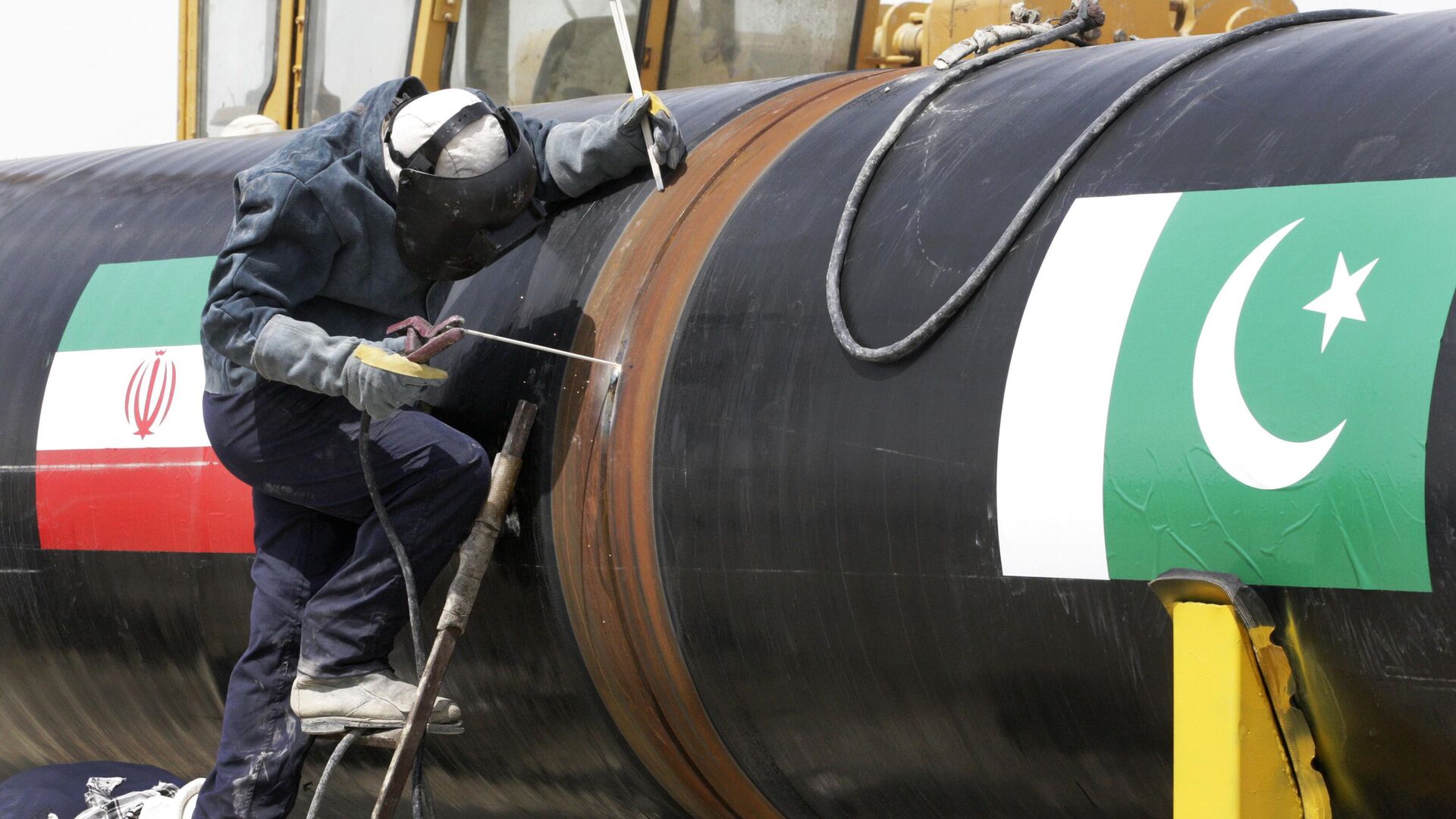https://sputniknews.in/20240131/which-countries-try-to-scuttle-iran-pakistan-ties-and-why-6392538.html
Which Countries Try to Scuttle Iran-Pakistan Ties and Why?
Which Countries Try to Scuttle Iran-Pakistan Ties and Why?
Sputnik India
In a bid to address the recent escalation in relations between Iran and Pakistan, the Iranian foreign minister embarked on a crucial visit to Islamabad.
2024-01-31T17:00+0530
2024-01-31T17:00+0530
2024-01-31T21:01+0530
ebrahim raisi
pakistan
iran
islamabad
national security
border dispute
cross-border terrorism
border tensions
trade corridor
https://cdn1.img.sputniknews.in/img/07e7/0b/11/5453218_0:160:3072:1888_1920x0_80_0_0_1893ca38932f5fbf6cc5720684191588.jpg
In a move that has surprised many, Iranian Foreign Minister Hossein Amir-Abdollahian demonstrated political maturity and wisdom by arriving in Islamabad to talk in person with his Pakistani counterpart regarding border security and bilateral relations.Earlier this month, the two Muslim nations had a tense standoff over their respective missile strikes in Pakistan's Balochistan and Iran’s Sistan and Baluchestan province, respectively. The attacks killed 11 people, including women and children, and posed a risk of a full-blown conflict.However, both Tehran and Islamabad focused on de-escalation of the situation, thereby setting an example of how a crisis can be defused through dialogue.Yesterday Amir-Abdollahian arrived in Islamabad and created headlines during his speech, when he said that "third countries" were involved in supporting terrorists in the border regions of Iran and Pakistan.External Western Forces Try to Take Advantage of Situation: ExpertThe Iranian foreign minister told reporters in Islamabad that there is “no doubt that the terrorists located in the common border regions and areas of Iran and Pakistan are led and supported by third countries, and they never favour any good action in line with the benefits of the Iranian and Pakistani governments and nations.”Although he didn’t specify which countries exactly, his statements caused quite a stir in political circles. Sputnik India reached out to several security analysts to discuss which countries these could be, and why they want instability in the Iran-Pakistan region.Looking at the possible agendas that these countries have in order to create destabilization between Pakistan and Iran, the analyst stated that it is "to secure various agendas of their own interests in the region."Political writer Parvez Salik told Sputnik that Iran and Pakistan must not let foreign states create chasms in their relationship, as that could have serious consequences for both countries.Earlier, in a conversation with Sputnik India, a former Pakistani high-ranking diplomat to the UAE who asked to remain anonymous, said that Pakistan is a strategic asset for Washington, through which it can try to disrupt China's Belt and Road Initiative that runs through Iran and Pakistan, as the two countries play an important role in the multi-billion dollar project. Mutual Security ConcernsDuring the recent meeting, the two foreign ministers discussed ways in which to strengthen the Iran and Pakistan partnership. They underscored the importance of robust dialogue and cooperation as the pathway for a positive and upward trajectory in their bilateral relations.In that regard political writer Parvez Salik said that addressing mutual security concerns, particularly along their shared border, is the hottest topic on the agenda, but not the only one. Although both sides have pledged to work for collective security, these promises should be followed by action to secure their common border.As per reports, during the visit, Iran’s foreign minister is also set to meet Pakistan’s caretaker Prime Minister Anwaar-ul-Haq Kakar. The foreign minister said that Iran’s President Ebrahim Raisi will visit Pakistan soon, adding that a date was yet to be determined.
https://sputniknews.in/20240127/nine-foreigners-killed-in-irans-sistan-and-balochistan-6361433.html
pakistan
iran
islamabad
Sputnik India
feedback.hindi@sputniknews.com
+74956456601
MIA „Rossiya Segodnya“
2024
Aneela Rashid
https://cdn1.img.sputniknews.in/img/07e6/0c/0d/74548_0:0:485:484_100x100_80_0_0_821526e967ae85d041e2d30ee34fa1de.jpg
Aneela Rashid
https://cdn1.img.sputniknews.in/img/07e6/0c/0d/74548_0:0:485:484_100x100_80_0_0_821526e967ae85d041e2d30ee34fa1de.jpg
News
en_IN
Sputnik India
feedback.hindi@sputniknews.com
+74956456601
MIA „Rossiya Segodnya“
Sputnik India
feedback.hindi@sputniknews.com
+74956456601
MIA „Rossiya Segodnya“
Aneela Rashid
https://cdn1.img.sputniknews.in/img/07e6/0c/0d/74548_0:0:485:484_100x100_80_0_0_821526e967ae85d041e2d30ee34fa1de.jpg
iranian foreign minister, hossein amir-abdollahian, islamabad, pakistani counterpart, border security, bilateral relations, muslim nations, missile strikes, balochistan, sistan and baluchestan, conflict, de-escalation, dialogue, external forces, terrorism, third countries, political circles, sputnik india, security analysts, fahad masood, political weakness, eastern forces, western forces, destabilization, foreign states, relationship consequences, china, belt and road initiative, geopolitical chaos, us interests, mutual security concerns, partnership, robust dialogue, cooperation, bilateral trade, economic interests, diplomatic ties, electricity transmission, border market, anwaar-ul-haq kakar, ebrahim raisi.
iranian foreign minister, hossein amir-abdollahian, islamabad, pakistani counterpart, border security, bilateral relations, muslim nations, missile strikes, balochistan, sistan and baluchestan, conflict, de-escalation, dialogue, external forces, terrorism, third countries, political circles, sputnik india, security analysts, fahad masood, political weakness, eastern forces, western forces, destabilization, foreign states, relationship consequences, china, belt and road initiative, geopolitical chaos, us interests, mutual security concerns, partnership, robust dialogue, cooperation, bilateral trade, economic interests, diplomatic ties, electricity transmission, border market, anwaar-ul-haq kakar, ebrahim raisi.
Which Countries Try to Scuttle Iran-Pakistan Ties and Why?
17:00 31.01.2024 (Updated: 21:01 31.01.2024) In a bid to address the recent escalation in relations between Iran and Pakistan, the Iranian foreign minister embarked on a crucial visit to Islamabad.
In a move that has surprised many, Iranian Foreign Minister Hossein Amir-Abdollahian demonstrated political maturity and wisdom by arriving in Islamabad to talk in person with his Pakistani counterpart regarding border security and bilateral relations.
Earlier this month, the two Muslim nations had a
tense standoff over their respective missile strikes in
Pakistan's Balochistan and Iran’s Sistan and Baluchestan province, respectively. The attacks killed 11 people, including women and children, and posed a risk of a full-blown conflict.
However, both
Tehran and
Islamabad focused on de-escalation of the situation, thereby setting an example of how a crisis can be defused through dialogue.
Yesterday
Amir-Abdollahian arrived in Islamabad and created headlines during his speech, when he said that "third countries" were involved in supporting terrorists in the border regions of
Iran and
Pakistan.
External Western Forces Try to Take Advantage of Situation: Expert
The Iranian foreign minister told reporters in Islamabad that there is “no doubt that the terrorists located in the common border regions and areas of Iran and Pakistan are led and supported by third countries, and they never favour any good action in line with the benefits of the Iranian and Pakistani governments and nations.”
Although he didn’t specify which countries exactly, his statements caused quite a stir in political circles. Sputnik
India reached out to several security analysts to discuss which countries these could be, and why they want instability in the Iran-Pakistan region.
According to a retired squadron leader in Pakistan’s Air Force and security analyst, Fahad Masood, "It is a matter of political weakness - when any country is internally weak that leads to the economy becoming weak. When that happens, external forces, either Eastern or Western, try to take advantage of the situation", the security analyst stated.
Looking at the possible agendas that these countries have in order to create destabilization between Pakistan and Iran, the analyst stated that it is "to secure various agendas of their own interests in the region."
Political writer Parvez Salik told Sputnik that Iran and Pakistan must not let foreign states create chasms in their relationship, as that could have serious consequences for both countries.
Earlier, in a conversation with
Sputnik India,
a former Pakistani high-ranking diplomat to the UAE who asked to remain anonymous, said that
Pakistan is a strategic asset for Washington, through which it can try to disrupt
China's Belt and Road Initiative that runs through Iran and Pakistan, as the two countries play an important role in the multi-billion dollar project.
"In all this geopolitical chaos, China's projects are going to suffer, which plays to the US' benefit. So keeping Pakistan unstable means that Chinese projects will suffer in the country as well", the diplomat said.
During the recent meeting, the two foreign ministers discussed ways in which to strengthen the Iran and Pakistan partnership. They underscored the importance of robust dialogue and cooperation as the pathway for a positive and upward trajectory in their bilateral relations.
In that regard political writer Parvez Salik said that addressing mutual security concerns, particularly along their shared border, is the hottest topic on the agenda, but not the only one. Although both sides have pledged to work for collective security, these promises should be followed by action to secure their common border.
"Shared economic interests between Iran and Pakistan often serve as a foundation for stronger diplomatic ties. Just last year, Pakistan-Iran had a volume of bilateral trade exceeding $2 billion. Numerous projects, including an electricity transmission project, trial run, border market, and other similar big projects are to be completed in the near future”, Salik told Sputnik India.
As per reports, during the visit, Iran’s foreign minister is also set to meet Pakistan’s caretaker
Prime Minister Anwaar-ul-Haq Kakar. The foreign minister said that Iran’s
President Ebrahim Raisi will visit Pakistan soon, adding that a date was yet to be determined.



